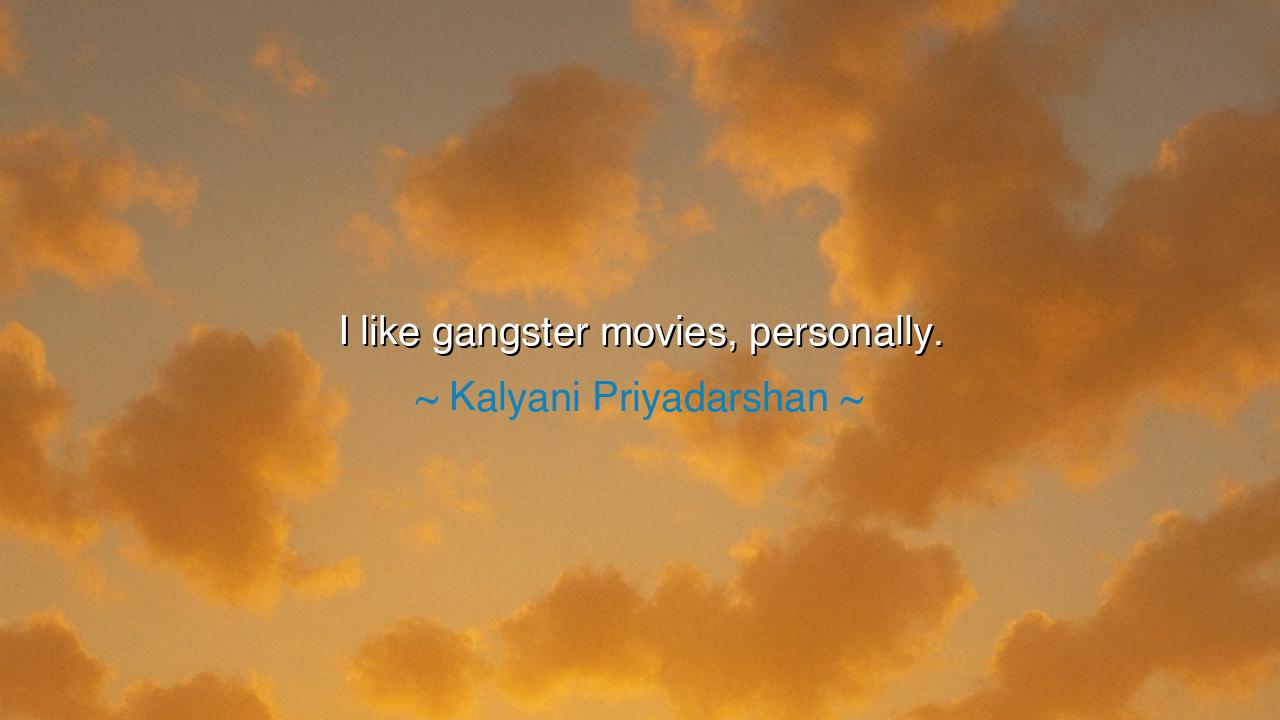
I like gangster movies, personally.






In the complex tapestry of human culture, few things hold as much power as the stories we tell ourselves and one another. Kalyani Priyadarshan’s simple declaration, “I like gangster movies, personally,” offers a window into the soul of a storyteller, someone who finds fascination in the raw, untamed narratives that gangster movies often embody. These films, often steeped in conflict, morality, and power, have long captured the imagination of audiences, evoking both fear and admiration for the characters who walk the thin line between honor and crime. There is something deeply compelling about these characters, who, in their rebellion against societal norms, force us to confront our own morality, loyalty, and sense of justice.
The origins of such tales can be traced back to ancient civilizations, where stories of outlaws, heroes, and villains filled the epic poems of Homer, the tragedies of Sophocles, and the plays of Shakespeare. In these early works, the gangster, though not named as such, exists in the figure of the rogue or the rebel. Consider the Greek hero Achilles, a man of great strength and valor, yet one who defied the gods and the law in pursuit of personal glory. Though not a criminal in the traditional sense, his actions demonstrate the same defiance of authority and the same complex relationship with honor that many gangster films portray. These stories resonate with the ancient hero’s journey, where the individual’s desires, often at odds with the law, drive the narrative.
In more modern times, the gangster has evolved from the mythic rebel into a cultural icon. Think of Scarface, the tale of Tony Montana, a man who rises from the depths of poverty to rule over a criminal empire, driven by ambition and the desire for power. His story, filled with both tragedy and violence, reveals the darker side of the American Dream, where success is achieved at great personal cost. Kalyani Priyadarshan, in her love for gangster films, taps into this deep well of fascination—she is drawn to the complexity of the gangster's world, a place where loyalty and betrayal, love and violence, and strength and vulnerability all collide in a storm of emotions.
These films, in their portrayal of the gangster figure, highlight the human condition in its most raw and unfiltered form. The gangster is often a figure outcast from society, yet paradoxically, they are imbued with a sense of honor, a personal code that, despite its flaws, offers a framework for their actions. This is what draws Kalyani and countless others to such films: the allure of the rebel, the individual who challenges authority and lives according to their own rules, seeking freedom in a world that often demands conformity. The gangster is both a villain and a tragic hero, someone who embodies the dangers of unchecked ambition but also the human struggle for autonomy and recognition.
However, as we delve deeper into these stories, we realize that the world of the gangster is not one of unmitigated success. There is always a price to be paid. The life of crime, while thrilling and full of power, is also one of corruption, betrayal, and self-destruction. Kalyani Priyadarshan’s preference for gangster movies is a reflection of our collective attraction to these complex narratives, but it also carries a cautionary tale. These stories remind us that unchecked ambition, when divorced from integrity, leads to ruin. The gangster’s life, though marked by moments of power, is ultimately a tragic one, for it is a life built on instability and violence. The stories, while captivating, are filled with warnings about the consequences of forsaking one’s humanity in the pursuit of personal gain.
The lesson here is one of balance. While it is natural to be drawn to rebellion, strength, and the allure of the gangster figure, we must remember that these qualities, if unchecked, lead to self-destruction. The gangster's code, though enticing, is often a path that leads to isolation, betrayal, and the ultimate loss of everything once held dear. In our own lives, we must seek to cultivate strength and individuality while remaining grounded in values of integrity, honor, and compassion. The true hero does not need to break the rules to be remembered, but rather lives with courage and conviction in the face of adversity, creating a legacy that endures through wisdom, not violence.
Let us, therefore, learn from the world of gangster movies the importance of self-awareness and discipline. While it is tempting to embrace the rebellious and untamed spirit, we must not lose sight of the need for balance in our lives. We must take from these films the understanding that true strength lies not in the power to destroy but in the ability to create, to build, and to live with honor in a world that often tests our resolve. In doing so, we will find a path not of destruction, but of growth, where we can walk with pride and courage, knowing that the true gangster is one who masters the self, rather than one who dominates the world.






AAdministratorAdministrator
Welcome, honored guests. Please leave a comment, we will respond soon